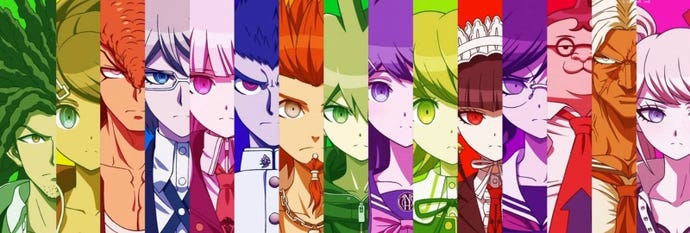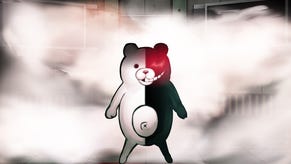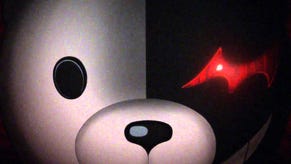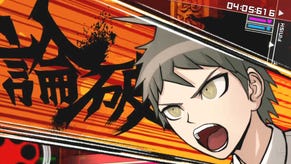Danganronpa: Trigger Happy Havoc Vita Review: Don't Despair
Pete and Cassandra delve into Spike Chunsoft's latest adventure for Vita -- a compelling, bleak and fascinating adventure through the darkness in human hearts, and whether everyone really does have a "price."
This article first appeared on USgamer, a partner publication of VG247. Some content, such as this article, has been migrated to VG247 for posterity after USgamer's closure - but it has not been edited or further vetted by the VG247 team.
Primary Reviewer, Pete Davison
There aren't many games that do "despair" quite as well as Danganronpa: Trigger Happy Havoc does.
I'm not talking about the game being unremittingly bleak, mind you -- that's one way of depicting the concept of "despair," sure, and one that has been used to particularly great effect in outright horror titles like the Corpse Party -- but instead the fact that the game's writers are particularly skilled at building up a sense of hope, happiness and positive thinking for the future of the characters, then dashing that hope against the rocks with anything from a grisly murder scene to the unpleasant realization that someone you previously trusted is, quite simply, lying to your face.
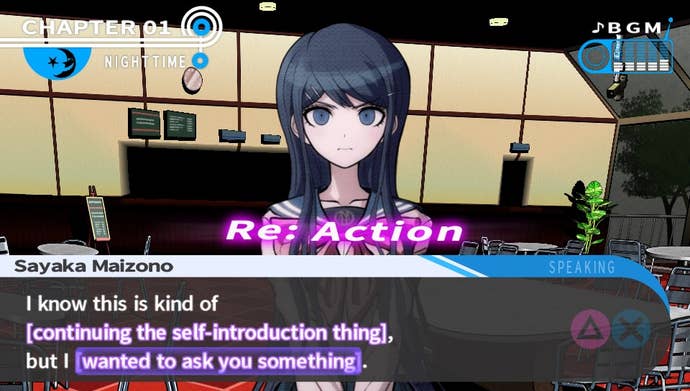
Those who have played Spike Chunsoft's most well-known games 999: Nine Hours, Nine Persons, Nine Doors and its sequel Virtue's Last Reward will doubtless be familiar with this feeling, and although Danganronpa wasn't written by Kotaro Uchikoshi, there's a lot in common between this title and Uchikoshi's Zero Escape series, most notably in terms of premise, setup and atmosphere.
For the uninitiated, here's the basic gist: you play Makoto Naegi, a self-confessed average Joe who somehow finds himself invited to attend the most prestigious school in the area: Hope's Peak Academy. When he arrives, he finds himself surrounded by other high school students who are at the top of their game, ranging from Junko the "Ultimate Fashionista," who graces many a magazine cover, to the painfully awkward "Ultimate Writing Prodigy" Toko, a best-selling author with a masochistic streak and a persecution complex. It transpires that his remarkable talent is being the "Ultimate Lucky Student," nothing more, and thus begins his new life at his new school.
Or so he thinks. It's not long after all the Ultimate students arrive that Makoto passes out and finds himself in a dark incarnation of Hope's Peak, where all the windows appear to have been boarded up with metal plates, and where a strange robotic teddy bear named Monokuma claims to be both the headmaster and the person in charge of what he calls a "killing game."
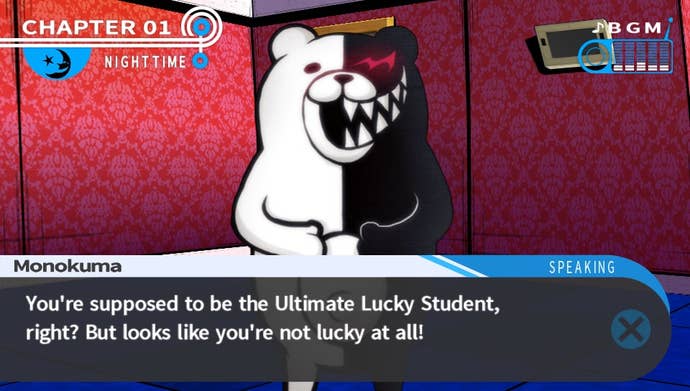
Monokuma tells the students they can escape from the school if they successfully kill someone and get away with it -- a process that will be tested by a series of "Class Trials" in which all of the assembled participants attempt to discover the truth. Should the "Blackened," as the murderer becomes known, be successful, then everyone else will be punished and the Blackened will graduate and be able to leave; conversely, if the Blackened is successfully identified in the class trial, they will be punished and everyone else will continue their life at Hope's Peak.
Thus begins an intriguing adventure in which you must solve a series of increasingly grisly murders while simultaneously attempting to build friendships with the surviving students and, eventually, figure out a way to escape from Hope's Peak, preferably without killing anyone.
It's a twisting, turning tale that isn't afraid to throw surprises in your path -- and this is where the "despair" aspect comes from. The narrative has no qualms about snatching favorite characters from you just as you feel like you're getting to know them, and if that happens then there's simply no resolution to their own personal tales -- just like suffering a real bereavement, there's no "good time" for it to happen, and no easy way to come to terms with it besides just trying your best to keep moving forward. Makoto doesn't really let the grief of losing his friends get to him anywhere near as much as I'd expect from someone in his particular situation, but this is probably a wise decision in terms of pacing: if the game forced you to sit through several in-game days of doing nothing but crying and punching walls, it would quickly become rather tiresome.
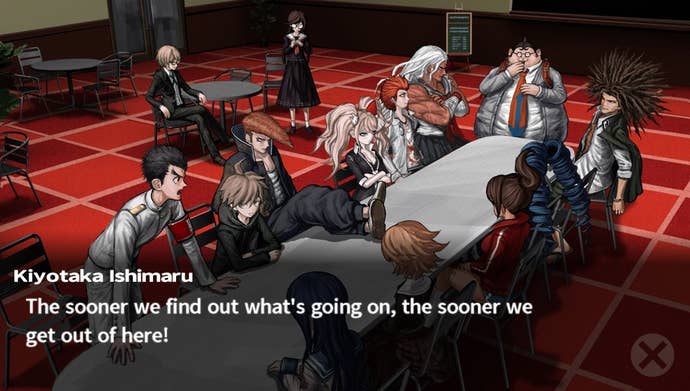
That's not to say Danganronpa pulls its emotional punches, however. If you've ever played Atlus' excellent Trauma Team, you may be familiar with the brilliant way its Dr. Naomi investigative sequences allow you to piece together exactly what happened through careful investigation, logical deduction and, eventually, that beautifully crafted "oh… s**t" moment when you realize what happened and have to take a moment to process the reality of what you've just deduced. Danganronpa works the same way in more ways than one; the Class Trials are frenetic, chaotic affairs that do well to reflect the inherent mayhem of real-life arguments through the limitations of technology, but throughout them you start to pick up gradual pieces of the complete picture and put them together in your mind -- and it's often not a pretty sight, particularly when you start realizing exactly who you've been locked in the school with. Not everyone is, to put it mildly, quite what they seem at first glance.
In the last step of each trial you're literally putting that picture together -- you're tasked with assembling a comic strip showing a step-by-step recreation of exactly what happened. Getting it right is undoubtedly satisfying, but also brings with it the bittersweet realization that you're condemning someone to Monokuma's sadistic "punishments" -- something which the game chooses to depict with a deliberately unsettling amount of glee, and something which actually made me have to put the game down and walk away for a little while after the first chapter. That hasn't happened to me for a long time, and it's testament to how much Danganronpa gripped me that it made me feel that way.
It's not just about the chaos of the Class Trials, though; between the battles for you and your classmates' survival, Danganronpa unfolds in several discrete components -- wandering around investigating the school, making use of your "free time" to build relationships and buy gifts for your classmates, and finally, investigating whatever horrible thing has happened this chapter. And there are some creatively horrible things that happen throughout the course of the game -- horrible things which, naturally, we'll leave for you to discover yourself.
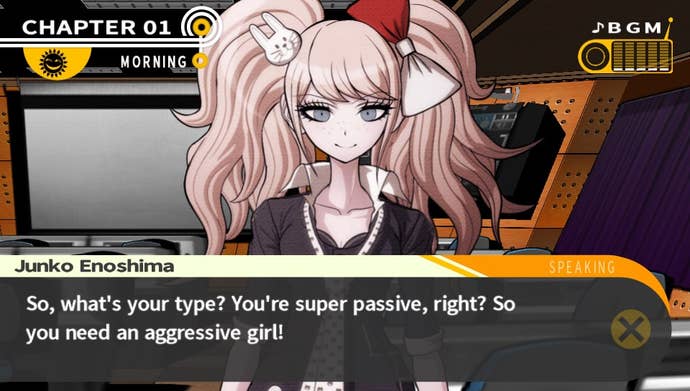
Of its various components, the only thing that feels a little undercooked is the dating sim-esque relationship-building Free Time periods, where you're given a couple of in-game days to pick which of the surviving characters you want to hang out with and perhaps buy a gift for: some of the characters' stories feel like they've been left hanging somewhat, even if you eventually do see them through to their respective conclusions. Couple that with the fact that it's very difficult to judge which of the game's "gift" items you should give them -- not to mention the fact that the gifts are awarded randomly from a capsule machine rather than purchased outright -- and you'll see how attaining 100% completion on the game can potentially prove to be an exercise in frustration. (The number of Zero Escape puns in the trophy list makes the process at least somewhat more palatable, however, it has to be said.)
There's no need to do all that, of course; Danganronpa provides a thoroughly satisfying experience purely from playing through the story from start to finish without attempting to min-max your relationships along the way. In fact, you'll probably have a superior experience if you do play that way first time around -- if you are the sort of person who likes to earn Platinum trophies, fill up galleries and earn bonus content, you can then go back and replay chapters to unlock other stuff, and there's an exceedingly cool "something extra" after you've beaten the game that I've been sworn to secrecy about. (Just… be sure to reload your last save. That's all I'm saying.)
Danganronpa's exactly the sort of thing I've come to expect from Sony's handheld in recent months: a memorable, stylish and effortlessly cool experience of the kind you simply don't get on any other platform. It's a brilliant game, a wonderfully crafted murder mystery, and one of the most engaging stories I've had the pleasure to plow through in recent months. Long may the Vita continue to play host to this kind of experience, because it's exactly the sort of thing I love to see.
Second Opinion, Cassandra Khaw
I have a confession: I play Danganropa at arm's reach. Like, literally. I hold the PS Vita as far away from me as possible, tipped slightly so I won't have to look at the full screen full on. Why? Because I'm convinced that "run" function is foreshadowing terrible things to come. At some point, a train of giggly, saw-toothed Monokumas is going to come barreling after me and that will be that.
If it wasn't obvious already, Danganropa: Trigger Happy Havoc makes me really, really nervous.
Not because of the gore, though. (Although I'm dead certain I've somehow missed a chase scene and/or jump scare somewhere but will see it happen, at some point..) I read enough horror to be ambivalent to the game's hot-pink, neutered expressions of violence. What gets to me is that oppressive sense of despair and hopelessness, the way distrust keeps tightening like a noose around the cast's dwindling good will. These are kids. Non-adults, with futures so bright they've been labeled the "ultimate" something or the other. In a different world, they'd be primed for long, happy lives or, at the very least, lives that involve considerable amounts of creature comforts. But Hope's Peak Academy is a bit of an ironic institution.
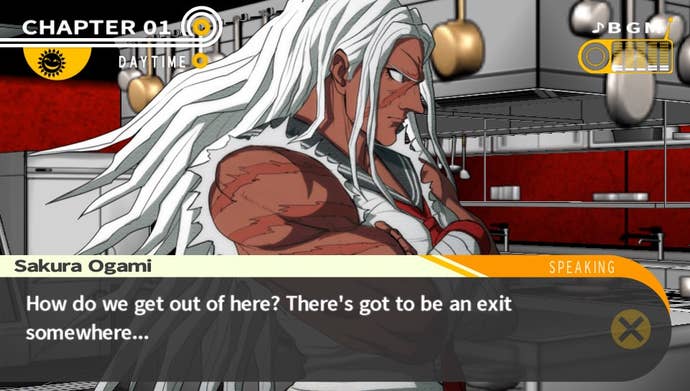
Danganropa's greatest triumphs, I think, are how well it communicates the dissolution of the human spirit and the way it appropriates familiar anime archetypes for its own purposes. The Ultimate Fan Fiction writer's a morbidly obese chap who makes uncomfortable allusions to sexual material. The Ultimate Baseball Star is fiery, red-headed and a bit of a slouch in person. The Ultimate Martial Artist? 'Roided, scarred, female and dressed in a sailor fuku because that's how funny is supposed to work. You'd think that it'd be difficult to care for such an eclectic roster but, to my surprise, I felt an immediate connection with them. I wanted them to succeed. I wanted them to live in spite of understanding that this was fundamentally impossible.
There's a familiar quote which keeps coming back every time I start thinking about Danganronpa: Everybody has a price. What's yours? What's mine? It's an idea that the game explores with extreme detail. Heck, it's one of the antagonist's primary goals -- to see what it takes to break average, upstanding Joe. And that's beautiful in a grim, twisted sort of way. More often than not, we see games try to convey "dark" and "mature" by using sexual violence, racism, genocide, child-killing and so on as their primary themes. But gritty isn't necessarily synonymous with such ideas. Gritty can be this: watching a bunch of kids collapse onto themselves. Sure, it's subtler than ripped clothing or gore but do we need those elements to make a disconcerting game? Obviously not.
The Nitty Gritty
- Visuals: Danganronpa is a striking game from a visual perspective, combining distinctive character designs with loud neon colors and a wonderfully surreal "pop-up book" aesthetic.
- Music and Sound: The music is often used as an overly cheerful juxtaposition with the bleak happenings on screen, but during the chaotic nature of the Class Trials the high-energy electronica complements the action very well. Voice acting is consistently strong -- particularly from the original Japanese voice track.
- Interface: Beautifully designed, full of bright colors, clear typefaces and easy to navigate menus. Information is easy to access and review at any time, so you're never left scrambling to remember things.
- Lasting Appeal: The basic plot is a decent length and certainly value for money, though once you've beaten it you'll know what's coming next time around -- there's only one ending. Added value comes from building relationships, trophy-hunting and [REDACTED] after you've finished it.
ConclusionA thrilling murder mystery from start to finish, Danganronpa is an essential purchase for those who enjoy games as interactive stories.
